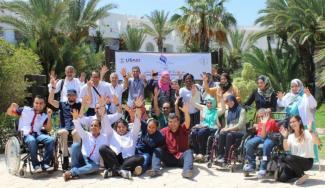USAID assistance helps to strengthen Libyan national and local government institutions, rule of law, the constitutional process, and elections and voter education. Despite the political impasse, USAID continues to provide an array of targeted assistance to build support for and enhance confidence in a stable, democratic Libyan government. This includes support for credible, transparent and inclusive electoral, political, and governing processes in Libya. USAID is helping to strengthen the ability of civil society and citizens to participate in the creation and adoption of a new constitution and the conduct of fair and peaceful elections, as well as helping make citizens’ voices heard in the decisions of their government. In areas recovering from recent conflict, USAID is supporting community reconciliation and recovery through community engagement and municipal council strengthening. USAID does this through the following programs:
LIBYA GOVERNANCE AND CIVIL SOCIETY PROGRAM (LGCS)
LGCS, also known as Taqarib (the Arabic term for “coming together” or “growing closer”), supports Libya’s political transition by strengthening the pillars of a stable, democratic, and responsive Libyan state through empowered civil society and strong local government. Taqarib works in 30+ municipalities nationwide, including six in underserved southern Libya, to bolster local governments as they navigate the challenges of decentralizing public services. Taqarib helped establish local government offices that explicitly support women and people with disabilities, as well as entrepreneurship and the environment. The program also reinforces community bonds and promotes citizen engagement in public dialogues and prioritization of public resources, establishing trust after five decades of neglect, instigation, and conflict.
Libya Governance and Civil Society Program (LGCS) Factsheet
LIBYA ELECTIONS AND LEGISLATIVE STRENGTHENING ACTIVITY (LELSA)
Decades of authoritarian rule, instability, and violence hindered Libya’s transition to a unified government that can maintain security and deliver essential services to its people. The U.S. government supports the aspirations of the Libyan people to vote for a national government that is transparent, accountable, and inclusive. USAID’s Libya Elections and Legislative Strengthening Activity (LELSA) supports Libyan-led initiatives that improve election administration, bolster civic and voter education, and encourage civic and political participation to support the country’s ongoing transition to a stable and democratic state that is free from malign foreign influence. The period of performance is 2018-2024.
Libya Elections and Legislative Strengthening Activity (LELSA) - Factsheet
PROMOTING LEADERSHIP AND ACTIVISM OF YOUTH (PLAY) FOR PEACE IN LIBYA
For more than a decade, Libya has been caught in a state of conflict with deep-seated divisions still prevailing in the country. However, the nationwide ceasefire in 2020 fostered hope for a more peaceful and democratic future. At this critical moment, it is essential for the youth to take a leading role in shaping a more inclusive, unified, and stable Libya. USAID's Promoting Leadership and Activism of Youth (PLAY) for Peace promotes local reconciliation efforts by bringing together young people from Misrata, Tawergha, Bani Walid, Zawia, and Sahl El-jfara —neighboring communities that have suffered from deep-rooted divisions and recurring violence— for positive interactions and to promote peace. The period of performance is 2020-2024
Promoting Leadership and Activism of Youth (PLAY) for Peace in Libya - PLAY for Peace Factsheet

(IFES for USAID)
